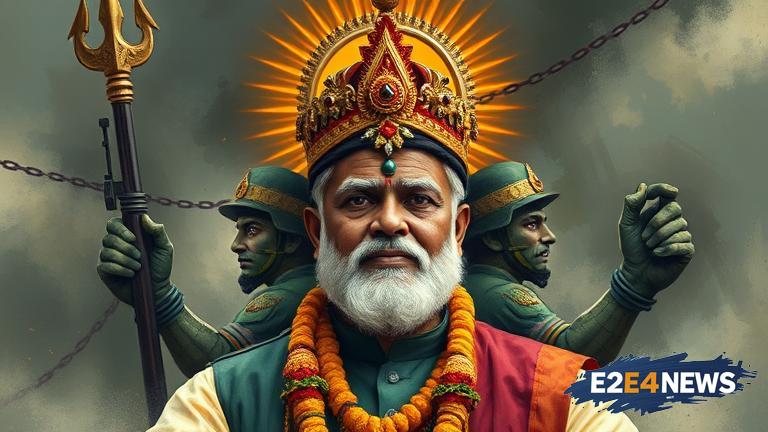India’s Defense Minister, Rajnath Singh, has expressed his deep reverence for Goddess Kali, attributing the Indian Armed Forces’ prowess to her special blessings. According to Singh, the goddess’s blessings have been a significant factor in the military’s strength and capabilities. The Defense Minister made these remarks during a recent event, where he emphasized the importance of faith and spirituality in the lives of soldiers. He believes that the goddess’s blessings have not only enhanced the military’s combat skills but also instilled a sense of courage and resilience among the troops. Singh’s statement has sparked a mix of reactions, with some hailing his sentiments as a testament to the country’s rich cultural heritage, while others have criticized him for mixing religion with the military. The Indian Armed Forces have a long history of bravery and sacrifice, with numerous examples of soldiers putting their lives on the line to protect the nation. The military’s strength and capabilities are a result of rigorous training, advanced technology, and strategic planning, but Singh’s comments suggest that he believes there is a divine element at play. Goddess Kali is revered as a powerful symbol of feminine energy and strength in Hindu mythology, and her blessings are believed to bring prosperity and protection to those who worship her. The Defense Minister’s remarks have been seen as an attempt to boost the morale of the troops and reinforce the idea that the military is not just a professional force, but also a symbol of national pride and cultural identity. However, some critics have argued that Singh’s comments may be perceived as divisive, and that the military should remain a secular institution. Despite the controversy, Singh’s statement has highlighted the significant role that faith and spirituality play in the lives of many Indians, including those serving in the military. The Indian Armed Forces are known for their diversity and inclusivity, with soldiers from different religious backgrounds serving together to protect the nation. The military’s secular ethos is enshrined in the Indian Constitution, which guarantees freedom of religion to all citizens. Nevertheless, Singh’s comments have sparked a debate about the intersection of faith and the military, with some arguing that the two should be kept separate, while others believe that faith can be a powerful motivator for soldiers. As the debate continues, one thing is clear: the Indian Armed Forces are a source of national pride, and their strength and capabilities are a result of a combination of factors, including training, technology, and teamwork. The military’s ability to adapt to changing circumstances and respond to emerging threats is a testament to their professionalism and dedication. In conclusion, the Indian Armed Forces are a vital institution that plays a critical role in protecting the nation and upholding its values. While the role of faith and spirituality in the military is a complex and contentious issue, one thing is certain: the troops’ bravery, sacrifice, and commitment to duty are an inspiration to the nation, and their contributions will always be remembered and honored.
